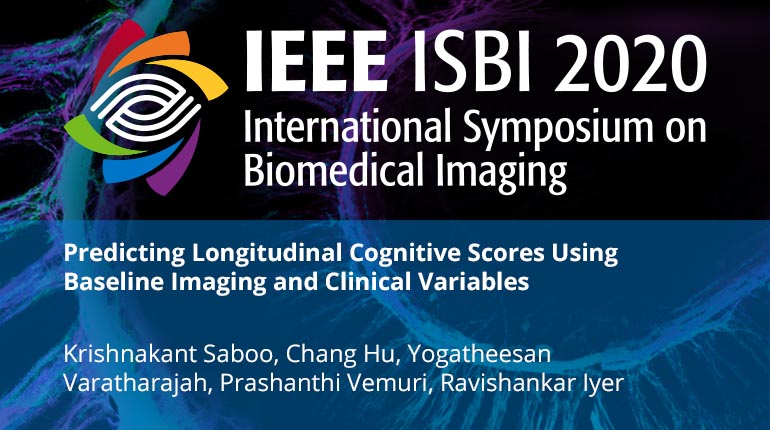
Already purchased this program?
Login to View
This video program is a part of the Premium package:
Predicting Longitudinal Cognitive Scores Using Baseline Imaging and Clinical Variables
- IEEE MemberUS $11.00
- Society MemberUS $0.00
- IEEE Student MemberUS $11.00
- Non-IEEE MemberUS $15.00
Predicting Longitudinal Cognitive Scores Using Baseline Imaging and Clinical Variables
Predicting the future course of a disease with limited information is an essential but challenging problem in health care. For older adults, especially the ones suffering from Alzheimer's disease, accurate prediction of their longitudinal trajectories of cognitive decline can facilitate appropriate prognostic clinical action. Increasing evidence has shown that longitudinal brain imaging data can aid in the prediction of cognitive trajectories. However, in many cases, only a single (baseline) measurement from imaging is available for prediction. We propose a novel model for predicting the trajectory of cognition, using only a baseline measurement, by leveraging the temporal dependence in cognition. On both a synthetic dataset and a real-world dataset, we demonstrate that our model is superior to prior approaches in predicting cognition trajectory over the next five years. We show that the model's ability to capture nonlinear interaction between features leads to improved performance. Further, the proposed model achieved significantly improved trajectory prediction in subjects at higher risk of cognitive decline (those with genetic risk and worse clinical profiles at baseline), highlighting its clinical utility.
Predicting the future course of a disease with limited information is an essential but challenging problem in health care. For older adults, especially the ones suffering from Alzheimer's disease, accurate prediction of their longitudinal trajectories of cognitive decline can facilitate appropriate prognostic clinical action. Increasing evidence has shown that longitudinal brain imaging data can aid in the prediction of cognitive trajectories. However, in many cases, only a single (baseline) measurement from imaging is available for prediction. We propose a novel model for predicting the trajectory of cognition, using only a baseline measurement, by leveraging the temporal dependence in cognition. On both a synthetic dataset and a real-world dataset, we demonstrate that our model is superior to prior approaches in predicting cognition trajectory over the next five years. We show that the model's ability to capture nonlinear interaction between features leads to improved performance. Further, the proposed model achieved significantly improved trajectory prediction in subjects at higher risk of cognitive decline (those with genetic risk and worse clinical profiles at baseline), highlighting its clinical utility.
 Cart
Cart Create Account
Create Account Sign In
Sign In





